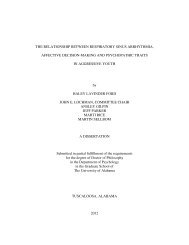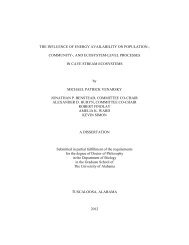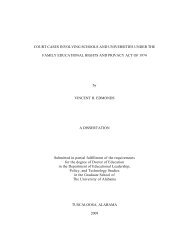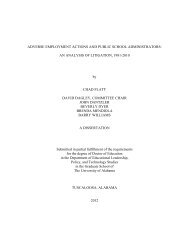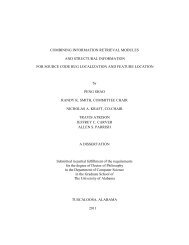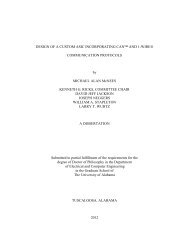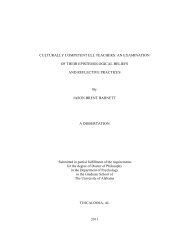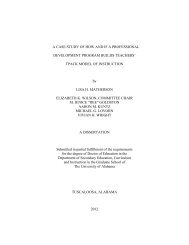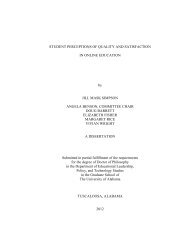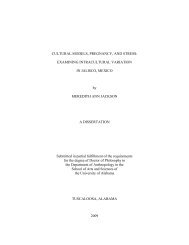- Page 1 and 2: CHILDREN’S SOCIAL REASONING IN TH
- Page 3 and 4: ABSTRACT The purpose of this study
- Page 5 and 6: ACKNOWLEDGMENTS This dissertation w
- Page 7 and 8: Victim ............................
- Page 9 and 10: Story Character Role ..............
- Page 11 and 12: LIST OF TABLES 1. CBVS Sample Demog
- Page 13 and 14: 30. Chi-Square (Ҳ 2 ) Test for Ind
- Page 15: CHAPTER I: INTRODUCTION TO THE PROB
- Page 19 and 20: Research Questions and Hypotheses T
- Page 21 and 22: . Null Hypotheses: There is no rela
- Page 23 and 24: information will be helpful to prac
- Page 25 and 26: Justice/Fair Justifications. An exp
- Page 27 and 28: CHAPTER II: LITERATURE REVIEW Chapt
- Page 29 and 30: actively involved, or as defenders
- Page 31 and 32: who are victimized themselves), and
- Page 33 and 34: Bullying often occurs within the co
- Page 35 and 36: manipulate social relationships to
- Page 37 and 38: Longitudinal studies of children en
- Page 39 and 40: Bully Bullying also damages the bul
- Page 41 and 42: for the nonbully/nonvictim. From co
- Page 43 and 44: Being victimized has been correlate
- Page 45 and 46: Linking Social Support and Bullying
- Page 47 and 48: (Bandura, 1986, 1991). Bandura (198
- Page 49 and 50: Social-cognitive learning theory ha
- Page 51 and 52: influenced and guided by informatio
- Page 53 and 54: ignore him or her, or that it is be
- Page 55 and 56: (Dodge, 1980a; Dodge & Frame, 1982)
- Page 57 and 58: during a child’s early years and
- Page 59 and 60: The reader is reminded that the pur
- Page 61 and 62: CBVS is scored by comparing the dif
- Page 63 and 64: Other research suggests that childr
- Page 65 and 66: their behaviors, which may explain
- Page 67 and 68:
Aggressive) and Justification Choic
- Page 69 and 70:
Cohen-Posey, 1995; Coloroso, 2003;
- Page 71 and 72:
children’s arrival, answered ques
- Page 73 and 74:
esponse to either being bullied or
- Page 75 and 76:
Peers (7 items) and the Aggressive
- Page 77 and 78:
Children’s Social Experience Ques
- Page 79 and 80:
Standard Deviations, ranges, and Cr
- Page 81 and 82:
Prosocial with Peers and CBS Aggres
- Page 83 and 84:
Choices (e.g., Prosocial, Aggressiv
- Page 85 and 86:
CHAPTER IV: RESULTS The purpose of
- Page 87 and 88:
for Prosocial Actions and victim ch
- Page 89 and 90:
Table 4 Psychometric Properties for
- Page 91 and 92:
all four stories. Bystander charact
- Page 93 and 94:
Victim character / relational victi
- Page 95 and 96:
Table 8 Psychometric Properties for
- Page 97 and 98:
Prosocial/Care justification or Jus
- Page 99 and 100:
Figure 1. Chi-Square (Ҳ2) Test for
- Page 101 and 102:
Figure 2. Chi-Square (Ҳ2) Test for
- Page 103 and 104:
Table 11 CBVS Chi-Square (Ҳ 2 ) Te
- Page 105 and 106:
Of the 187 responses to Prosocial/C
- Page 107 and 108:
of children’s Prosocial Action Ch
- Page 109 and 110:
Table 15 Predicting Action Choices
- Page 111 and 112:
Table 18 Predicting Action Choices
- Page 113 and 114:
participant child variable such as
- Page 115 and 116:
Figure 4. Chi-Square (Ҳ2) Test for
- Page 117 and 118:
A test for the Difference in Propor
- Page 119 and 120:
Figure 5. Chi-Square (Ҳ2) Test for
- Page 121 and 122:
Table 24 CBVS Test and Confidence I
- Page 123 and 124:
Therefore, I reject the null hypoth
- Page 125 and 126:
Figure 6. Chi-Square (Ҳ 2 ) Test f
- Page 127 and 128:
Table 28 CBVS Test and Confidence I
- Page 129 and 130:
Justice/Fair) on bystander and vict
- Page 131 and 132:
A test for the Difference in Propor
- Page 133 and 134:
of children’s Aggressive/Retribut
- Page 135 and 136:
Story Form of Victimization The nex
- Page 137 and 138:
A test for the Difference in Propor
- Page 139 and 140:
hypothesis and I conclude that ther
- Page 141 and 142:
Figure 9. Chi-Square (Ҳ 2 ) Test f
- Page 143 and 144:
Table 38 CBVS Test and Confidence I
- Page 145 and 146:
Justice/Fair Justification Choice r
- Page 147 and 148:
Figure 10. Chi-Square (Ҳ 2 ) Test
- Page 149 and 150:
Figure 11. Chi-Square (Ҳ 2 ) Test
- Page 151 and 152:
Action Choices in this study varied
- Page 153 and 154:
CHAPTER V: DISCUSSION How people ju
- Page 155 and 156:
y administering the measure in a in
- Page 157 and 158:
get what they deserve.” It is lik
- Page 159 and 160:
engaging in high rates of aggressiv
- Page 161 and 162:
ability. The lack of variance in te
- Page 163 and 164:
lie in the lack of variability in C
- Page 165 and 166:
whether the story character was a b
- Page 167 and 168:
Schwartz et al., 1998). These child
- Page 169 and 170:
of the independent variable such as
- Page 171 and 172:
strong component, which is directed
- Page 173 and 174:
too long, given other curriculum-ba
- Page 175 and 176:
REFERENCES Ableson, R. P. (1981). T
- Page 177 and 178:
Brewster, A. B., & Bowen, G. L. (20
- Page 179 and 180:
Craig, W. M., Henderson, K., & Murp
- Page 181 and 182:
Dodge, K. A. (1980a). Social cognit
- Page 183 and 184:
Frisch, M. B. (2000). Improving men
- Page 185 and 186:
Haynie, D. L., Nansel, T. R., Eitel
- Page 187 and 188:
Ladd, G. W., & Burgess, K. B. (2001
- Page 189 and 190:
Munoz, M. A., & Vanderhaar, J. E. (
- Page 191 and 192:
Paquette, J. A., & Underwood, M. K.
- Page 193 and 194:
Rogers, M. J., & Tisak, M. S. (1996
- Page 195 and 196:
Smokowski, P. R., Reynolds, A. J.,
- Page 197 and 198:
Turiel, E. (2006). Thought, emotion
- Page 199 and 200:
APPENDICES 185
- Page 201 and 202:
Date, ______________, 2009 Malvin (
- Page 203 and 204:
Appendix C School Approvals 189
- Page 205 and 206:
191
- Page 207 and 208:
Appendix D Informed Consent Forms 1
- Page 209 and 210:
195
- Page 211 and 212:
197
- Page 213 and 214:
Asian American European Ame
- Page 215 and 216:
Rate each reason for how good you t
- Page 217 and 218:
III. Of all the actions that you ju
- Page 219 and 220:
5. Talk to Mike about his feelings
- Page 221 and 222:
4. Make up something about the mean
- Page 223 and 224:
Appendix F Teacher Online Questionn
- Page 225 and 226:
fights with peers. 1 = Never True 2
- Page 227 and 228:
• Make new friends / change peer
- Page 229 and 230:
• Get bullies to think about thei
- Page 231 and 232:
217



